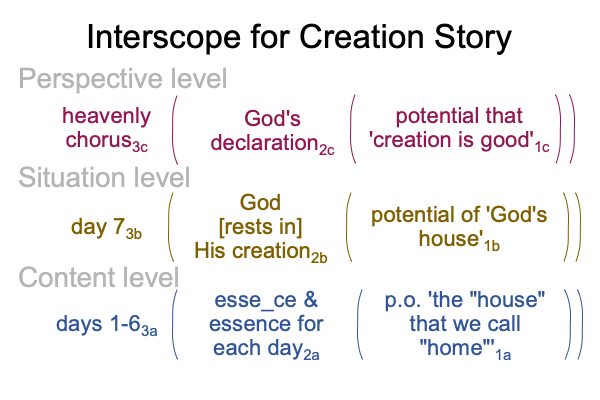0049 What is proposition five?
In the Creation Story, God’s declarations of goodness provide perspective.
0050 If day seven virtually situates days one through six and if the heavenly chorus proclaims the news of God’s domain, then when God declares, “it is good”, in the Creation Story, there is someone to receive the message.
Now, of course, some members of the angelic choir realize, “it is not good”, for them. From what I understand, this scenario defines the opening of John Milton’s masterwork, Paradise Lost.
0051 As far as the category-based nested form goes, God’s declaration caps the situation of day seven, as shown in the following interscope. The three-level interscope is presented in A Primer on Sensible and Social Construction, available at smashwords and other e-book venues.

0052 Walton writes that God’s declarations of goodness, which occur after each day (with one exception), must be understood in terms of lexical and contextual inquiry. This is the closest we can get to plain speaking.
Lexical inquiry explores the way that words are used. “Good” describes God. “Good” contrasts with “evil”. A good thing works the way that it is supposed to.
Contextual inquiry investigates the range of situations in which a word appears. What would the negation of “good” look like? Well, Genesis 2:18 offers one example. God says that it is not good that man should be alone. Does that imply that there is something unworkable about Adam’s situation?
You bet.
0053 Walton tries to square the circle on day two, where there is no declaration of goodness. One reason is obvious. Both the waters above and the waters below are altered in subsequent days. The waters above are adorned when lights in the firmament become visible… er… are installed, in day four. The waters below separate into land and sea, in day three.
0054 But, that is not the controversy.
Today, many project all sorts of meanings, presences and messages into the word, “good”. These projections lead people to conclude that God’s creation is not good. I mean, why create the light and darkness before putting lights in the firmament? Why natural evil? Why are we born in pain? Why do we die in pain?
The thought-leaders of our current Lebenswelt spin fantasies around the word, “good”. They project perfection into the creation before the Fall. They project the absence of natural evil. They project a message of a bliss where no-one feels pain. They say, “If God’s creation does not satisfy the criteria that we project, then it is not ‘good’.”
0055 In response, consider this Jobian thought experiment.
I am in the city. I conform to my thought-leader’s world views. Creation is not good. We must constantly struggle to bring the goodness that “we” desire to life.
After the cognitive bubble of all projections pops, my world falls into ruin. I flee the city. I learn to live in the wild. I join others in a band of like-minded survivors. Life seems to be hard, but God provides. We learn to run with nature.
Sometimes, I have nightmares of the world that I used to live in, a world far from nature, a world full of pomposities imposing preposterous projections upon the word, “good”. I wake up and realize, “Right now, I live the way I evolved to be. I have never been so happy. Every night I see the stars. I follow the planets. I regard the moon. In their silence, they sing in unison. The heavens declare the goodness of the Lord.”
